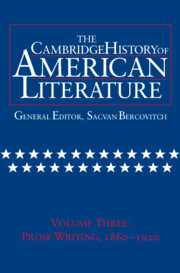Book contents
- Frontmatter
- Introduction
- THE AMERICAN LITERARY FIELD, 1860–1890
- LITERARY FORMS AND MASS CULTURE, 1870–1920
- 1 Museum Realism
- 2 Howells, James, and the republic of letters
- 3 Women and Realist authorship
- 4 Chesnutt and imperial spectacle
- 5 Wharton, travel, and modernity
- 6 Adams, James, Du Bois, and social thought
- PROMISES OF AMERICAN LIFE, 1880–1920
- BECOMING MULTICULTURAL: CULTURE, ECONOMY, AND THE NOVEL, 1860–1920
- Chronology 1860–1920
- Bibliography
- Index
6 - Adams, James, Du Bois, and social thought
from LITERARY FORMS AND MASS CULTURE, 1870–1920
Published online by Cambridge University Press: 28 March 2008
- Frontmatter
- Introduction
- THE AMERICAN LITERARY FIELD, 1860–1890
- LITERARY FORMS AND MASS CULTURE, 1870–1920
- 1 Museum Realism
- 2 Howells, James, and the republic of letters
- 3 Women and Realist authorship
- 4 Chesnutt and imperial spectacle
- 5 Wharton, travel, and modernity
- 6 Adams, James, Du Bois, and social thought
- PROMISES OF AMERICAN LIFE, 1880–1920
- BECOMING MULTICULTURAL: CULTURE, ECONOMY, AND THE NOVEL, 1860–1920
- Chronology 1860–1920
- Bibliography
- Index
Summary
By the start of the new century, fiction was as secure a cultural institution as any museum of brick and mortar. The proof was not only that the genre had earned public recognition as a high art, as when novelists were among the artists elected in 1898 to the newly founded American Academy of Arts and Letters. Beyond its new civil recognition, fiction itself was also now widely deemed a unique resource for civil society. “It is fair to assume,” Meredith Nicholson wrote in a 1902 Atlantic article, “that in the nature of things we shall rely more and more on realistic fiction for a federation of the scattered states of this decentralized and diverse land of ours in a literature which shall be our most vivid social history.” Nicholson limited this office of literary federation to “realistic” fiction, but critics in growing numbers were ready to dispute the primacy of Realism. Even so, it was largely under the watchword of Realism that this rather extraordinary notion – that the United States had a unifying meaning and history best grasped in fiction – had become by century's end an almost commonplace idea.
William Dean Howells received much of the credit for the new esteem accorded fiction. The younger novelist Frank Norris claimed that Howells had produced “the foundation for a fine, hardy literature we could call our very, very own.” But in a 1915 letter Howells described himself as “a dead cult with my statues cut down, grass growing over them in the pale moonlight.” The high literary status he had promoted for fiction endured. But in the new century the museum-like function he had helped establish for Realism – the work of supplying “exact” representations to instruct and cultivate the American public – would lose much of its authority.
- Type
- Chapter
- Information
- The Cambridge History of American Literature , pp. 247 - 284Publisher: Cambridge University PressPrint publication year: 2005



